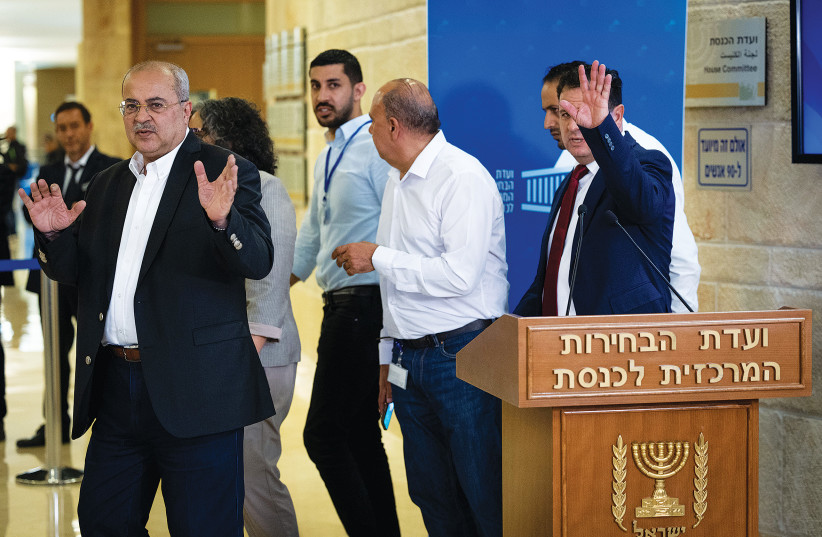Good evening, ladies and gentlemen. We are here to present the 2022 Election Academy Special Achievement Awards, and acknowledge the star performers and best acts of the fifth election cycle.
The ultimate winners and losers can be finalized only after next week’s final ballot, but the imminent end of the campaign spurs us to recognize and showcase those who faltered and those who stuttered. All of the recipients have significantly contributed to the storyline of the election campaign while demonstrating outstanding or noteworthy disappointing performances.
So let’s begin. The first award goes to...
The rising star – Itamar Ben-Gvir
Love him or hate him, Itamar Ben-Gvir’s exponential and phenomenal success is a mathematical fact.
Over three years ago, when his party, Otzma Yehudit, ran alone in the second election, he had 83,609 voters, only 1.88% of the vote, far short of the electoral threshold. In the following March 2020 elections, his popularity dropped by 75%, hardly reaching 20,000 supporters.
Today, his joint list with Bezalel Smotrich is projected to be the third or fourth-largest party, with 12-13 seats in the latest polls, meaning over 400,000 voters, and most of them are Ben-Gvir fans and followers.

Over the course of the past three years, under the auspices and sponsorship of Benjamin Netanyahu, and with generous assistance from the media, Ben-Gvir’s Kahanist past and present racism have been whitewashed and legitimized. Gradually, he softened and moderated his extremist nationalist and supremacist agendas and supposedly moved toward the mainstream, while constantly staging confrontations and provocations to stay at the top of the headlines, masterminding prime-time TV.
Thriving on the collective trauma after the May 2021 violent riots in the mixed Jewish-Arab cities, Ben-Gvir plays up the sense of fear and danger, and with his laid-back style and charisma, he attracts new audiences, especially the younger generations of right-wingers.
If Netanyahu is regularly dubbed “BB-king,” Ben-Gvir is emerging as the prince of the Israeli Right. However, while acknowledged for his outstanding popular breakthrough, he also is slated to achieve another award, marking his outstanding bad contribution to the populistic wave and the radicalization of the Right.
The day after the elections, his popularity will probably turn into a menace for Netanyahu, especially if he achieves a 61-seat majority and forms a far-right-wing coalition. Smotrich and Ben-Gvir have high goals and hopes for plush and prestigious portfolios, such as the Defense and Public Security ministries, while Netanyahu is likely to prefer keeping the prominent positions in close and safe Likud hands and minimizing international scrutiny. The stronger Ben-Gvir ends the elections, the more Netanyahu will be trapped by Ben-Gvir’s agenda and demands.
Best dramatic act/worst career move: the Joint List split
The last-minute disintegration of the Arab parties’ Joint List in mid-September, just an hour and a half before the deadline for submitting the lists, is the leading contender for the Most Dramatic Act Award. It could very well turn out to be the tipping point of the fifth elections, as it split the Arab electorate into three and threatens to put least one of the parties under the 3.25% threshold, if not two, in the doomsday scenario.
According to recent polls, only Ra’am is considered to be safe and stable, while Hadash-Ta’al and Balad are fighting over the same electorate, to survive.
If the pessimistic predictions about the Arab voter turnout materialize and both parties fall under the threshold, Netanyahu’s path back to power will be open and clear, and the Arab representation in the Knesset will sink to a dangerous low. Ayman Odeh, Ahmad Tibi, and Sami Abou Shahadeh will find themselves without a job.

To add to the split, the Arab parties also failed to sign vote-sharing agreements to prevent dozens of thousands of votes from going down the drain. The surplus deals – which enable parties to combine their leftover votes, which can add up to a full Knesset seat, which is transferred to one of them – can be decisive in the final tally. Nevertheless, the Arab parties couldn’t suspend their fighting and bickering for the common cause, in another self-destructive performance that undermines their own political future and strength.
For the split and the absence of surplus deals, the Arab politicians are recognized also with a Special Achievement “What were you thinking?” Award.
Best on-screen duo performance – Lapid’s Rose Garden vs the BB bus
The battle between Netanyahu and Yair Lapid over the premiership and leadership presented a new and refreshing storyline, despite the sense of déjà vu in the ongoing political crisis. For the first time in a decade, the Prime Minister’s Office was not used by the Likud campaign, Netanyahu has been campaigning as leader of the opposition, and Lapid enjoyed the perks of the No. 1 job and waged a rose garden campaign.
Lapid’s caretaker premiership took off in July with President Joe Biden’s visit, and he concludes the campaign with the historic maritime border agreement with Lebanon. In between, he successfully handled a major IDF operation in Gaza, traveled to Paris, Berlin and New York City, where he took Netanyahu’s traditional stage at the UN General Assembly and, just like him, adequately timed his speech for prime-time TV for the local audience.
Meanwhile, exiled from his traditional headquarters, Netanyahu took his campaign to the streets, and has been touring the country on the Likud-branded “Bibi-Bus,” convening three to four rallies a day.
The relative freedom from the heavy security demands imposed on the leader of the opposition, in open-air and mass crowds, plays out in Netanyahu’s favor. First, he can intermediately meet large audiences and supporters. Moreover, being so close to his fans highlights his new role and status: after over a year in the opposition, Netanyahu wants to provoke feelings of banishment and displacement to motivate fans and mobilize his electoral base.
Lapid has been the main subject of Netanyahu’s rally speeches, and he hasn’t missed an opportunity to slam and criticize his government and foreign policy decisions. Netanyahu ignored Lapid’s offer to hold an official election debate, stung from a historic flop performance in 1999, but he’s trying to drag him into a close head-to-head battle nevertheless, in order to put the small parties to his Left, Meretz and Labor, in grave danger.
After many years of political disregard and disdain, in four months Lapid proved that yes, he can. But that won’t necessarily stand the morning after the elections. If Netanyahu wins his 61-seat victory, Lapid’s caretaker term will be over; and even if he doesn’t, Benny Gantz will try to bring it to an end. Which leads us to our next award...
Worst screen combo and oddest name of the year – the National Unity Party
As a leader of a relatively small party, Gantz’s natural role is as a supporting act to the Netanyahu-Lapid leadership crusade, but early on in the elections he circled his goal and announced he is running for the premiership.

Gantz tried to relive the same strategy that originally established the Blue and White list in the first 2019 elections, and to strengthen his party with right-wing and left-wing elements, hoping to create a centrist platform to appeal to a wide electorate.
With Gideon Sa’ar and Ze’ev Elkin, on the one hand, and his IDF buddy Gadi Eisenkot, on the other, Gantz was hoping to double his strength, while weakening Netanyahu and Lapid, and change the dynamics into a three-headed race.
So far, the varied and distinguished supporting cast has been a box office flop. The alliance with Sa’ar didn’t create a wave of new right-wing supporters, the much-awaited Eisenkot debut, which was supposed to mobilize Yesh Atid and Labor voters, had close to zero influence and was considered a big disappointment, and even the most popular Yamina refugee, Matan Kahana, who was supposed to attract the National-Religious electorate, wasn’t a game changer.
The National Unity Party has been steadily polling at 11-13 seats, not much more than what Gantz and Sa’ar would bring if they were running independently by themselves, and at the moment it is far from its original game-changing promise.
Nevertheless, no matter its final size and result, Gantz plans to join Netanyahu and Lapid on the central stage after the election, and challenge them both to break the deadlock.
